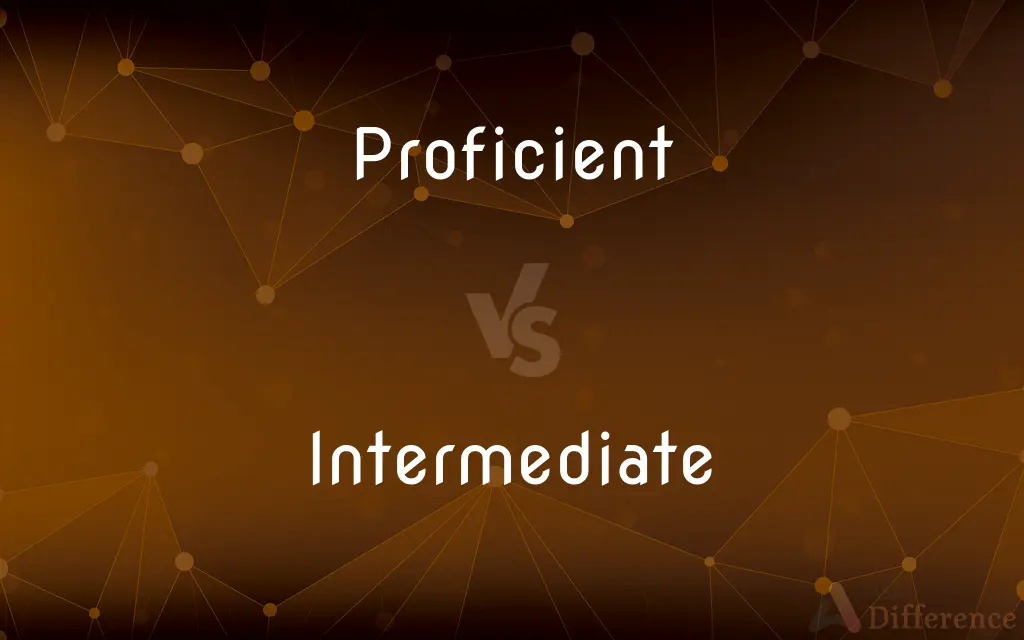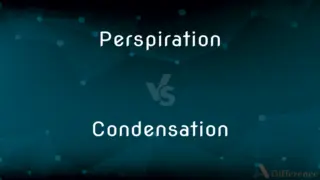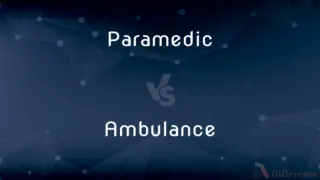Proficient vs. Intermediate — What's the Difference?
Edited by Tayyaba Rehman — By Urooj Arif — Updated on March 9, 2024
Proficient individuals demonstrate a high level of skill or knowledge in a particular area, whereas intermediate signifies a level of understanding or skill that is between basic and advanced.

Difference Between Proficient and Intermediate
Table of Contents
ADVERTISEMENT
Key Differences
Proficiency indicates a high degree of competence, often implying expertise and mastery in a particular field. Individuals at this level can perform tasks with confidence and efficiency. On the other hand, the intermediate level denotes a midpoint of learning or development, where individuals have moved beyond beginner status but have not yet achieved full expertise.
While proficient individuals are typically able to handle complex tasks and make informed decisions with minimal guidance, intermediate individuals may still require support for more complex issues, reflecting a solid foundational understanding but not complete autonomy.
Proficiency is marked by the ability to innovate, lead, and provide solutions to novel problems, whereas intermediate skills are characterized by applying learned knowledge to familiar scenarios with occasional guidance.
Proficient learners often engage in refining and expanding their knowledge and skills, focusing on nuance and complexity. In contrast, intermediate learners work on solidifying their understanding and extending it to more complicated situations.
A proficient status often requires formal recognition or certification in professional contexts, demonstrating a recognized level of expertise and competence. Intermediate status, by contrast, indicates progress and a commitment to learning, without necessarily involving formal certification.
ADVERTISEMENT
Comparison Chart
Skill Level
High expertise, mastery
Between basic and advanced
Autonomy
Can operate independently, minimal guidance needed
Requires occasional support for complex tasks
Complexity Handling
Handles complex tasks and decision-making
Manages familiar scenarios with more complexity than beginners
Focus
Refinement and expansion of knowledge and skills
Solidifying understanding and applying it to complicated cases
Certification
Often requires formal recognition or certification in professional contexts
Indicates progress, no formal certification required
Compare with Definitions
Proficient
Mastery.
Her proficiency in piano is showcased through her ability to play complex compositions effortlessly.
Intermediate
Learning Phase.
Being in the intermediate phase means constantly learning and applying new information.
Proficient
Highly Skilled.
She is proficient in three languages, allowing her to communicate effectively in diverse settings.
Intermediate
Solid Foundation.
With an intermediate skill set in baking, she can make a variety of desserts.
Proficient
Efficient.
Proficient workers complete tasks quickly and with high quality.
Intermediate
Requires Support.
Intermediate players often need coaching to improve their game strategy.
Proficient
Expertise.
His proficiency in software development is evident from the complex projects he's completed.
Intermediate
Developing Skills.
He is at an intermediate level in Spanish, capable of holding conversations but not fluently.
Proficient
Advanced Knowledge.
Being proficient in a field often means contributing new knowledge or techniques.
Intermediate
Mid-Level Understanding.
Her intermediate knowledge of coding enables her to contribute to projects with guidance.
Proficient
Competent or skilled in doing or using something
I was proficient at my job
She felt reasonably proficient in Italian
Intermediate
Coming between two things in time, place, character, etc.
A cooled liquid intermediate between liquid and solid
An intermediate stage of development
Proficient
A person who is proficient
He became a proficient in Latin and Greek
Intermediate
An intermediate thing.
Proficient
Having or marked by an advanced degree of competence, as in an art, vocation, profession, or branch of learning.
Intermediate
Act as intermediary; mediate
Groups which intermediated between the individual and the state
Proficient
A person who exhibits such competence; an expert.
Intermediate
Lying or occurring between two extremes or in a middle position or state
An aircraft having an intermediate range.
An intermediate school.
Proficient
Good at something; skilled; fluent; practiced, especially in relation to a task or skill.
He was a proficient writer with an interest in human nature.
Intermediate
One that is in a middle position or state.
Proficient
An expert.
Intermediate
An intermediary.
Proficient
One who has made considerable advances in any business, art, science, or branch of learning; an expert; an adept; as, proficient in a trade; a proficient in mathematics, music, etc.
Intermediate
(Chemistry) A substance formed as a necessary stage in the manufacture of a desired end product.
Proficient
Well advanced in any branch of knowledge or skill; possessed of considerable acquirements; well-skilled; versed; adept,
Intermediate
An automobile that is smaller than a full-sized model but larger than a compact.
Proficient
Having or showing knowledge and skill and aptitude;
Adept in handicrafts
An adept juggler
An expert job
A good mechanic
A practiced marksman
A proficient engineer
A lesser-known but no less skillful composer
The effect was achieved by skillful retouching
Intermediate
To act as an intermediary; mediate.
Intermediate
To intervene.
Intermediate
Being between two extremes, or in the middle of a range.
Intermediate
Anything in an intermediate position.
Intermediate
An intermediary.
Intermediate
(chemistry) Any substance formed as part of a series of chemical reactions that is not the end-product.
Intermediate
(intransitive) To mediate, to be an intermediate.
Intermediate
(transitive) To arrange, in the manner of a broker.
Central banks need to regulate the entities that intermediate monetary transactions.
Intermediate
Lying or being in the middle place or degree, or between two extremes; coming or done between; intervening; interposed; interjacent; as, an intermediate space or time; intermediate colors.
Intermediate
Of or pertaining to an intermediate school; as, intermediate education.
Intermediate
To come between; to intervene; to interpose.
Intermediate
A person who intermediates between others, especially in negotiations; an intermediary; a mediator.
Intermediate
Something that is intermediate.
Intermediate
A compound which is produced in the course of a chemical synthesis, which is not itself the final product, but is used in further reactions which produce the final product; also called synthetic intermediate, intermediate compound or intermediate product; - contrasted to starting material and end product or final product. There may be many different intermediates between the starting material and end product in the course of a complex synthesis; as, many industrial chemicals are produced primarily to be used as intermediates in other syntheses.
Intermediate
A substance formed during a chemical process before the desired product is obtained
Intermediate
Act between parties with a view to reconciling differences;
He interceded in the family dispute
He mediated a settlement
Intermediate
Lying between two extremes in time or space or degree;
Going from sitting to standing without intermediate pushes with the hands
Intermediate stages in a process
Intermediate stops on the route
An intermediate level
The last time I saw Paris
The last day of the month
Had the last word
Waited until the last minute
He raised his voice in a last supreme call
The last game of the season
Down to his last nickel
Intermediate
Around the middle of a scale of evaluation of physical measures;
An orange of average size
Intermediate capacity
A plane with intermediate range
Medium bombers
Common Curiosities
How do you know if you are at an intermediate level?
You're at an intermediate level if you've moved beyond basics, can handle moderately complex tasks with some guidance, and are continuously learning.
What is the intermediate level?
The intermediate level signifies a state between beginner and expert, where one has surpassed basic understanding but hasn't reached full expertise.
Is certification always necessary for proficiency?
While not always necessary, certification can formalize one's proficiency level in many professional contexts.
Do proficient individuals need to keep learning?
Yes, to maintain proficiency, continuous learning and adaptation to new techniques and knowledge are essential.
What defines a proficient individual?
A proficient individual demonstrates a high level of skill or knowledge, often implying expertise and mastery in a particular area.
What role does experience play in reaching proficiency?
Experience is crucial, as it allows individuals to apply and refine their skills in real-world situations.
Can proficiency be achieved in any field?
Yes, proficiency can be achieved in any field with dedicated study, practice, and application.
Can proficiency fade over time?
Yes, without regular practice and updating of knowledge, proficiency in a skill can diminish.
Can someone be proficient in one area and intermediate in another?
Absolutely, individuals often have varying levels of skill across different areas of expertise.
What's the key difference between proficient and intermediate workers?
Proficient workers operate independently and handle complex tasks efficiently, while intermediate workers may require occasional guidance.
Are intermediate skills valuable in the workplace?
Yes, intermediate skills are valuable as they demonstrate a solid foundational understanding and the potential for growth.
Does proficiency guarantee success?
While proficiency enhances the likelihood of success, factors like adaptability, creativity, and interpersonal skills also play significant roles.
How can an intermediate learner progress to proficiency?
Through dedicated practice, advanced learning, and application of skills in increasingly complex scenarios.
How long does it take to move from intermediate to proficient?
The time varies significantly across fields and individuals, depending on the complexity of the skill and the effort invested.
Is it possible to assess proficiency objectively?
Proficiency can often be assessed through tests, certifications, and performance evaluations, though criteria may vary by field.
Share Your Discovery

Previous Comparison
Perspiration vs. Condensation
Next Comparison
Paramedic vs. AmbulanceAuthor Spotlight
Written by
Urooj ArifUrooj is a skilled content writer at Ask Difference, known for her exceptional ability to simplify complex topics into engaging and informative content. With a passion for research and a flair for clear, concise writing, she consistently delivers articles that resonate with our diverse audience.
Edited by
Tayyaba RehmanTayyaba Rehman is a distinguished writer, currently serving as a primary contributor to askdifference.com. As a researcher in semantics and etymology, Tayyaba's passion for the complexity of languages and their distinctions has found a perfect home on the platform. Tayyaba delves into the intricacies of language, distinguishing between commonly confused words and phrases, thereby providing clarity for readers worldwide.
















































